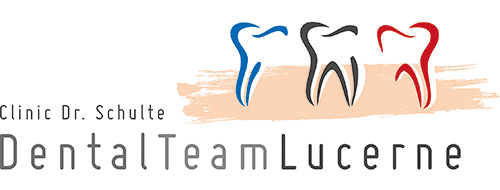Testimonials
Read the first-hand reports by patients who have received treatment in our surgery. These are real stories in the patients’ own words; we have not changed them. Naturally, though, all patients concerned have given their express permission for publication.
Katharina Lanfranconi, art director and poet, Lucerne
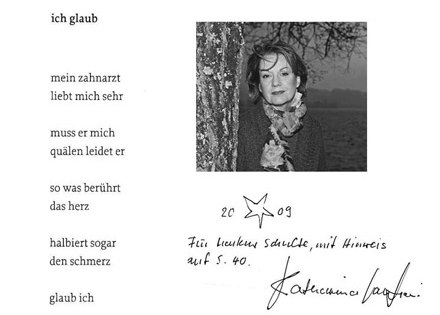
Felix F. Walz
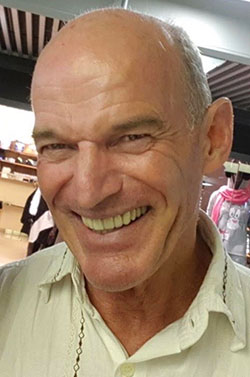
Dear Dr Schulte,
the wonderful Lucerne Dental Team members and particularly Ms Eugster,
One of the maxims I abide by is attributable to the Italian polymath Galileo Galilei: “Curiosity is the key to problem-solving”. These words have guided me throughout my life, helping me to deal with complex challenges – both at a professional and a personal level. You know from our interaction that I have been supporting peace-building and humanitarian projects in the West African nation of Liberia for close to five years now and that I have had to witness what it means for people living in extreme poverty to have little or no access to aid. “Curiosity” is overshadowed by the sheer need to survive, and the people I mentor lack access to appropriate medical treatment.
There it was. The toothache that just got worse and worse; the problems I experienced while eating and the accompanying unsightliness had been telling me for years that I had to do something. What a contrast to the conditions in West Africa! Stable internet access, for one: in just a few clicks, I’m on the attractively designed Lucerne Dental Team homepage. But that’s not all: during the course of my travels, I also read an article about the services your practice offers in an in-flight magazine. I established contact with your energetic and enthusiastic team for the first time with great speed and ease and without having to place huge demands on my “problem-solving-focused curiosity”. Please allow me to single out Ms Eugster, my point of contact, for commendation. That’s just the way it is: initial interactions and discussions make a lasting impression. I subsequently dealt with other capable and consistently courteous members of the team; this meant that I felt very well cared for and in good hands at all times. You could well term this “role-model team spirit”! A huge compliment!
And then, of course, dear Dr Schulte, there’s you! Your skill, your body of knowledge, your finely-honed empathy, coupled with an infectious sense of humour, meant that I never for an instant doubted my decision. Of course, some procedures did result in a little soreness – but medication and treatment instructions saw me through.
There is not a great deal left to say about the treatment itself, as it is the overall impression and, ultimately, the result that counts. The prep carried out by your specialists, the anaesthesia and the care and support I was provided before, during and after the various treatment procedures were exactly right for me. What astonished me was that you called via mobile to enquire about my condition even outside regular working hours. I also appreciated your team’s flexibility whenever I could not avoid rescheduling appointments because of my travel commitments.
I am very satisfied – indeed, happy – with the results. This has completely changed my outlook on life. My family and the people I know here in Switzerland as well as in West Africa share my delight. God willing, at some point I hope that the African families I support will be able to access a facility if they experience unbearable toothache rather than – at best – taking painkillers imported from another third world country – if at all.
I am hugely grateful to you, and I look forward to interacting with you and your “dream team” whenever I require dental care in the future.
Felix F. Walz
Bowier Trust Foundation Switzerland
Chairman
Klaus Galliker, 61 years old, retailer, Rotkreuz ZG
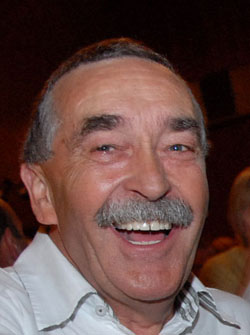
As a retailer, I am always surrounded by people and have to spend the whole day talking to my customers, suppliers etc. For many years, I had continuous trouble with my teeth. Periodontitis had affected both roots and bone and my teeth had shifted. I thought of my repulsive teeth as a severe affliction in my dealings with other people, in addition I had problems with bad breath; in short, I felt ashamed to open my mouth.
My son alerted me to Dr. Schulte whom he knew personally. At the first consultation, Dr. Schulte told me that in his opinion the best solution for me was total restoration with implants. The crucial argument for me was that it could all be done in a single operation under general anaesthetic and that I would have stable and presentable teeth straight away.
The surgery was successful, and for the period afterwards I had no problems at all with my quite presentable temporary teeth. Since then, I have been fitted with my permanent fixed dentures. I have not regretted for a minute having had this treatment as recommended by Dr. Schulte. Thanks to my beautiful and firm teeth, I have regained my self-confidence; I can eat whatever I want, and ever since I got my new teeth, I have not had any problems with bad breath. I would like to pay Dr. Schulte and his team a very big compliment and many thanks for their perfect care in every respect.
Sandra Egger, 27 years old, student, Lucerne
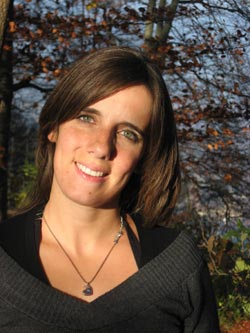
Twenty-five years old and still unhappy with the alignment of my teeth. That had been my situation about two years ago. Even though I was not happy with the alignment of my teeth, I could not come to terms with the thought of a “train-track” brace. On these “I am unhappy with my teeth”-days, I would surf the net for possible methods to correct my teeth. I finally came across a new form of treatment known as Invisalign. A series of thin plastic aligners gently move the teeth into the desired position. An added advantage is that the aligners are hardly visible for others. My interest was aroused and I quickly made a first appointment with the surgery of Dr. Schulte.
After the first consultation, it was clear to me that this was the right treatment choice for me. On my second visit, all the necessary moulds of my teeth were taken, and about a month later, I was able to collect my first set of aligners.
The day had come when I would wear my braces for the first time. When I put the aligners in, there was an unfamiliar feeling of tension in my teeth. Also, the braces interfered a little bit with my speech. However, after only 1 to 2 days, the unpleasant feeling was gone, and on the whole I have really got used to the braces. They no longer affect me when I am talking. At first, I had to practice for 3-4 minutes each time before removing the braces, but after a few days, I had learnt that, too, and was able to remove the braces within seconds.
The first fortnight passed quickly, and soon I was able to swap the aligners for the first time. This pattern continued; after wearing each set of aligners for 14 days, I could swap them. Each time, it meant a return of the feeling of tension in my teeth – but that would only last for 2-3 hours. I was able to observe with satisfaction the alignment of my teeth changing over the next few weeks. After approximately 15 months, the time had come to fit the last set of aligners – that was a really wonderful feeling.
While I was wearing the braces, I was very interested in the reactions of people around me. Some of my fellow students noticed the braces after a while, with others I am still not sure whether they ever noticed them at all. The more observant of my colleagues were all very interested and asked me lots of questions. I had to explain several times how this new treatment method works.
Two years on, I have not only become two years older, but I am also totally happy with the alignment of my teeth!
Philipp Terry, 58 years old, academic dean, Lucerne
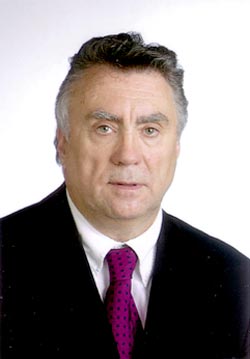
Pain-free treatment is absolutely important for me as a patient. In that respect, I would like to put on record that Dr. Markus Schulte uses a very pleasant form of anaesthesia hitherto unknown to me, namely intraligamentary anaesthesia.
The actual insertion of the needle is almost and sometimes entirely pain free, because the needles are very fine indeed. The effect is immediate, as only the tooth itself is anaesthetised. The surrounding tissue (cheeks, lips) and the neighbouring teeth retain their normal sensitivity – there is no numbness in the cheeks, tongue and lips, and sensation is fully restored only 30 minutes after the end of treatment.
As I have plenty of experience from many years of dental treatment by dentists all over the world, I would like to state that Dr. Schulte is truly exemplary. Worth a mention is not only his very precise approach, but also the time that he takes to provide his patients with comprehensive information.
Giusi Stehrenberger, 49 years old, housewife, S. Nazzaro TI
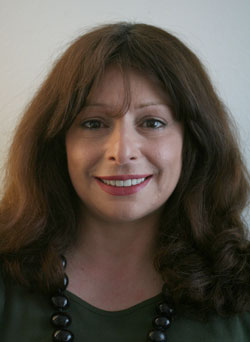
My dentist had diagnosed advanced periodontitis, and I had visions of dentures in a glass by my bedside. I care about my appearance, and I felt a shock every time I looked in the mirror and saw my ugly teeth. With some desperation, I looked for the best solution for me. Purely by accident, I came across Dr. Schulte’s informative website, and I called to make an appointment. While Dr. Schulte confirmed my dentist’s serious diagnosis that my upper teeth were beyond salvation, he gave me new hope at the same time that implants could restore my natural smile.
He suggested to have the entire restoration performed under general anaesthetic in a single procedure. Of course to start with, I was very anxious, but Dr. Schulte and his team provided optimal support on each step of the way with great psychological empathy. On the actual day of the surgery, I thus felt calm and optimistic. The day after the surgery, I had hardly any pain; furthermore, I was able to chew properly with the fixed, albeit then still provisional, teeth. Even these temporary teeth looked far better than my old ones, but I was really happy when I received my final bridge about three months later. Never before in my life have I had such beautiful teeth.
Ruth Ammann, 52 years old, clerk, Lucerne
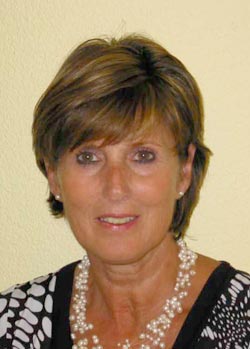
In a magazine in a doctor’s surgery, I had seen an article about Dr. Schulte’s surgery and about dental brace treatment for adults. My badly aligned teeth had long been a major source of discontent in my life, but I had just resigned and accepted them as given, because I had no idea that they could still be changed. This article gave me new hope. My next step was to visit Dr. Schulte’s very informative website, where I found comprehensive reports about the various treatment options for dental correction in adults. Then I made an appointment for a consultation.
Dr. Schulte and Dr. Zuran explained to me in detail the advantages and disadvantages of the various treatment options that might be open to me. I decided in favour of Invisalign, because I wanted an invisible correction without fixed braces. If I had worn visible braces, I would have felt embarrassed in front of friends and acquaintances.
I felt quite excited on the day that I got my first Invisalign aligner. From day one, I had no trouble whatsoever for the entire duration of the treatment, which took a year. After only a few days, I no longer noticed the transparent aligners. The best thing was that nobody in my circle of friends and acquaintances, including my own husband, noticed the Invisalign aligners. Of course I told my husband about them later.
I am absolutely delighted with the results. After only a year, I had the beautiful straight teeth that I had always dreamt of. In the end, I also treated myself to bleaching. People often comment now on my beautiful teeth.
Michael Portmann, 42 years old, business economist, Kriens LU
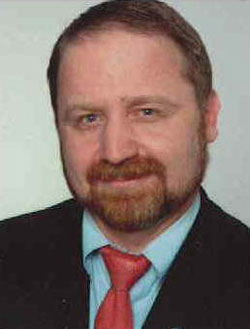
Only a year ago, I suffered from severe dentophobia. Now when I go and see my dentist – even for major procedures – I feel relaxed and free from any anxiety. This development is not only remarkable and pleasing, but it has also considerably improved my quality of life.
My fear of dentists dates back to my childhood – seemingly not uncommon in patients with this kind of anxiety. As the result of rather unpleasant memories of visiting the orthodontist, I had avoided even routine visits to my dentist since my late teens. In the end, this “dental abstinence” lasted for more than 20 years. For all that time, two retention brackets remained on my upper two back molars. These brackets were never designed to remain in the mouth for that long and had over recent years caused ever more problems. On a Sunday about three years ago, toothache finally motivated me for the first time to a thorough internet search on dentophobia and its possible treatments. Very soon, I got to Dr. Schulte’s website. I almost sent an email there and then, but in the end my fear was stronger. At first, I put the email of until “tomorrow”, but then I never got beyond the thought.
Because of the reason I described, one of the affected molars broke off while I was on holidays in Portugal last autumn. An immediate visit to a dentist in Portugal became unavoidable in order to have the remaining fragment of the tooth removed, which was wobbly and painful. The visit to the local dentist resulted in two opposing experiences. The positive experience was that the wobbly section of the tooth was removed without pain. But there was also the negative one: the local dentist showed no empathy whatsoever with my phobia. However, I did follow his insistent advice to visit a dentist as soon as I returned to Switzerland. The same afternoon, I sat in the hotel gardens and searched the web for “dentist+fear+Lucerne” and soon got back to Dr. Schulte’s website. This time I did not hesitate, but sent an email with a detailed description of my problem. The reply email from Aida Hrustanovic (dental assistant in Dr. Schulte’s surgery) was not only surprisingly quick, but also very friendly and welcoming. A date for my initial appointment was thus quickly agreed. The night before my visit to the dentist, though, was anything but comfortable. I hardly slept a wink. My thoughts went round in circles, from “I am finally doing the right thing” to “It can’t be all that bad” and “I wonder what he will find”, leading to horrible visions of the actual treatment. It was with very mixed feelings that I stepped into the surgery. However, what I experienced then did not tally at all with my fears – on the contrary. The first appointment had deliberately been made for the evening, when no other patient was around. I did not have to sit around in the waiting room. I received a very friendly welcome; my first consultation with Dr. Schulte was in his office and not in the much-feared dentist’s chair. Dr. Schulte listened to my “tale of woe” with patience and understanding. This conversation laid the foundation of trust. My “agreement” to having my mouth examined and the test “How do I react to laughing gas?” were the logical consequences. My initial tension soon disappeared – mainly because of the effect of the laughing gas. I did not perceive this as unpleasant. The calm and professional approach by Dr. Schulte and his dental assistant were crucial in this. His verdict after the examination was not nearly as bad as I feared.
Considering that I had not been to a dentist for twenty years, my teeth were really not that bad. However, the brackets remaining in my mouth had caused some problems that needed remedial action. Also, two wisdom teeth needed extraction. Fortunately for me, there were no holes. However, Dr. Schulte also observed that laughing gas was not as effective for me as for many other patients. For that reason, he recommended for all actual treatments a combination of laughing gas and a sedative which would, however, necessitate another person to drive me to the surgery and back. There followed two major treatment session using the agreed combination of laughing gas and a sedative. Both of these treatments were not only absolutely pain-free, but also, much to my surprise, even rather pleasant. Surrounded by beautiful music, I could let my thoughts drift to other realms. After all, I had nothing else to do than lying there and keeping my mouth open. These two very positive experiences motivated me to do without the sedative in the future. The initially discussed option of treatment under general anaesthetic (in conjunction with the surgical procedure for implanting an implant and the extraction of two wisdom teeth) was no longer an issue. Even without the sedative, my experience remained completely positive throughout.
As a final major procedure, my implant was fitted two weeks ago. Even leading up to the appointment, I had no doubts, nervousness or even fear. On the contrary. Just before the actual appointment, I used the half hour of free time to enjoy an espresso in the nearby café and to read the paper. The procedure itself went without a hitch and seemed over in the blink of an eye. When the dental assistant assured me with the best of intentions that they were now closing the wounds and that it would very soon all be behind me, I replied: “I don’t mind, you could have just carried on a bit more.” And I meant every word. After only a year, I have got to the stage that I do not consider a visit to the dentist of any greater importance as one to the hairdresser. (I must admit that I still don’t actually love going to the dentist, but then, who does?) The most important thing though is that I don’t feel fear or anxiety either before or during treatment. It is not just nice to be able to crunch apples again with my restored teeth. At least as valuable is the experience of having overcome my strong phobia; on the whole, this is a very positive experience for me. It is part of the same thing that these days I can talk openly about a problem which I had carried around inside me for years, hidden even from the person I am closest to.
My advice to any reader who – like me about three years ago – read Dr. Schulte’s website full of anxiety, but also in the search for a solution is: Do not hesitate, face up to your fears.
- Any pain you may experience will more than likely disappear again, but your underlying problem will remain.
- Broken teeth don't mend themselves. You can be absolutely certain: without treatment it will get worse.
- And the most important aspect: don't continue to miss out on an important part of quality of life.
Don’t wait until tomorrow or even the day after before you email the dentist. Write your email today. My own experience has shown that this first step is indeed the hardest one. After that, everything almost happens by itself. My own experience has convinced me: you are not going to regret this step!
Testimonials from the field of pediatric dentistry can be found here: What parents write us.
